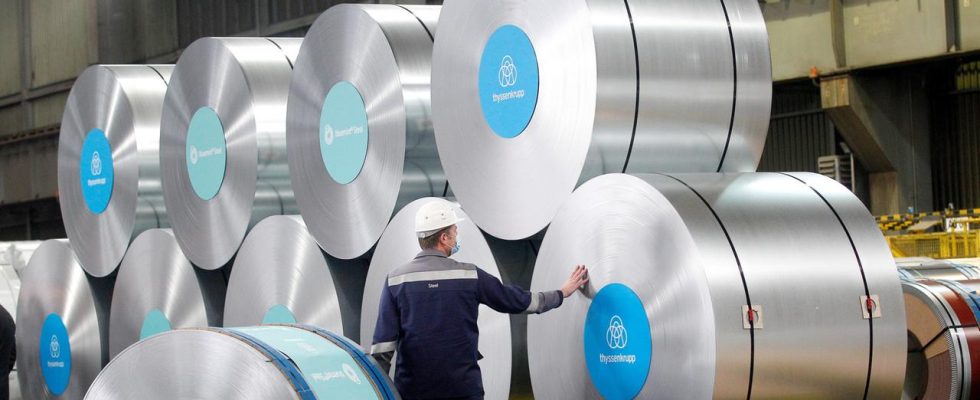Due to high energy costs and value adjustments in the steel division, Thyssenkrupp
made a loss in the second quarter. How the difficult steel business will continue is still unclear.
Thyssenkrupp slipped into the red in the second quarter of fiscal 2022/23. The reason for this was, on the one hand, value adjustments in the steel division. The industrial group had to write off almost 350 million euros on the steel business. The management explained that the value adjustments were made because of increased interest rates and the associated higher cost of capital.
In addition, higher costs for raw materials and energy as well as lower steel prices led to significant losses in the operating result. Earnings before interest and taxes (EBIT), adjusted for special effects, have shrunk from EUR 802 million a year ago to EUR 205 million.
The bottom line was therefore a loss of 223 million euros in the months of January to March. In the previous year, Thyssenkrupp had made a net profit of 565 million euros. The group’s turnover fell from 10.6 billion to 10.1 billion euros and was also above market expectations. In contrast, incoming orders fell significantly from EUR 13.6 billion to EUR 10.2 billion.
The “problem child” steel
In contrast, the order situation in the steel business developed positively. There were higher order volumes, especially from the construction and automotive industries, and incoming orders rose by nine percent. The steel business is problematic because it is extremely dependent on the economy and therefore susceptible to fluctuations. Steel is the company’s “problem child”, judges Ingo Speich from Deka Investment.
In the past fiscal year, the division generated sales of around 13 billion euros. This makes it the second-largest division, behind materials trading and services (Material Services), with sales of around 16 billion.
Sale or IPO?
So far, plans for a sale or an IPO have failed. According to outgoing CEO Martina Merz, Thyssenkrupp is aiming for the steel division to become independent even after the change in management. “We are convinced that this will open up the best possible future prospects for the business,” wrote Merz and CFO Klaus Keysberg in the quarterly report.
The group creates further conditions for an independent list of the steel. “This includes examining possible cross-sector and cross-country partnerships.” Energy partnerships could be considered, which would give the steel business secure access to competitive energy costs. “Here we have started promising talks with possible partners.”
Interviews with several interested parties
Recently there had been reports that Emirates Steel Arkan was considering a stake. The Indian JSW Steel and the buyout company CVC Capital Partners have also expressed an interest in Thyssenkrupp’s steel business in recent months, the Bloomberg news agency reported.
According to the information, Thyssenkrupp has also held preliminary talks with private equity firms about the sale of a minority stake in its Marine Systems division. Thyssenkrupp describes itself as the world market leader in the construction of conventional submarines. The portfolio also includes naval surface vessels.
What is Borrego up to?
From June 1st, Miguel Ángel López Borrego will have to take care of the future of the division. Martina Merz recently surprisingly announced that she would be leaving the company. Borrego previously led the auto supplier Norma, was head of Siemens Spain and chairman of the supervisory board at Siemens Gamesa.
Hendrik Schmidt, governance expert at DWS, which is one of Thyssenkrupp’s largest shareholders, had said that while steel was an important part of Borrego’s to-do list. But he also had to find solutions for the group’s defense and hydrogen business.

